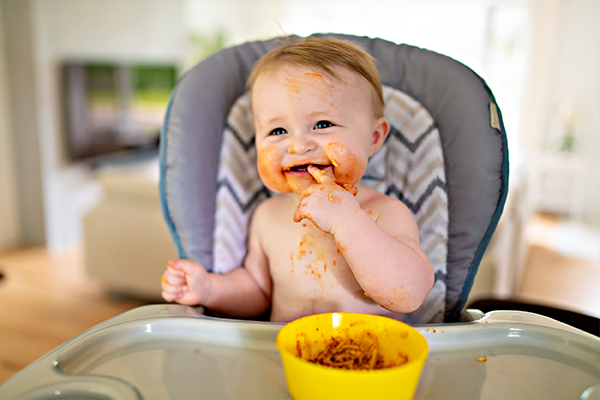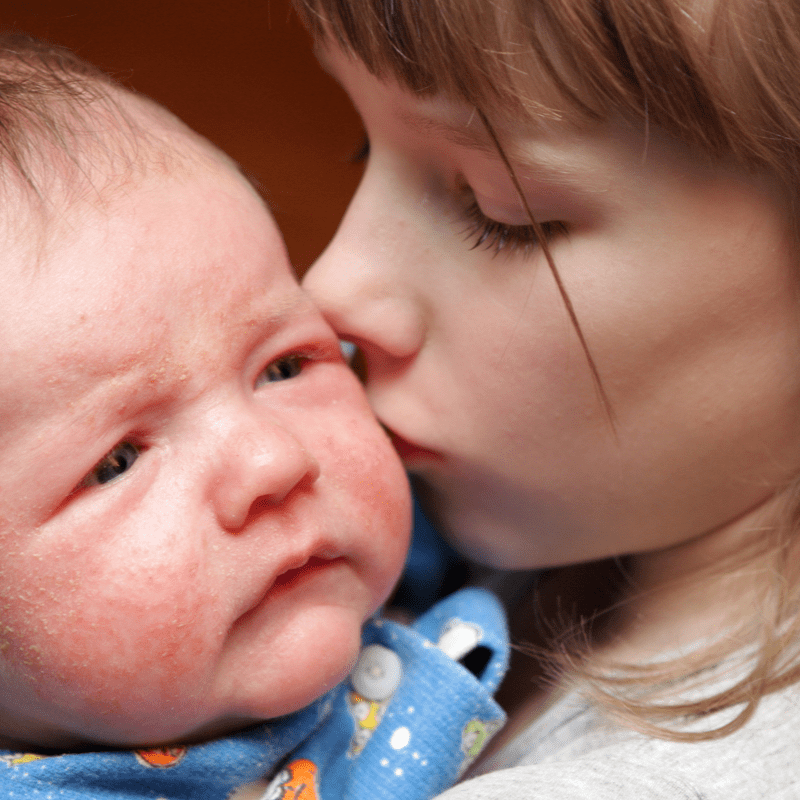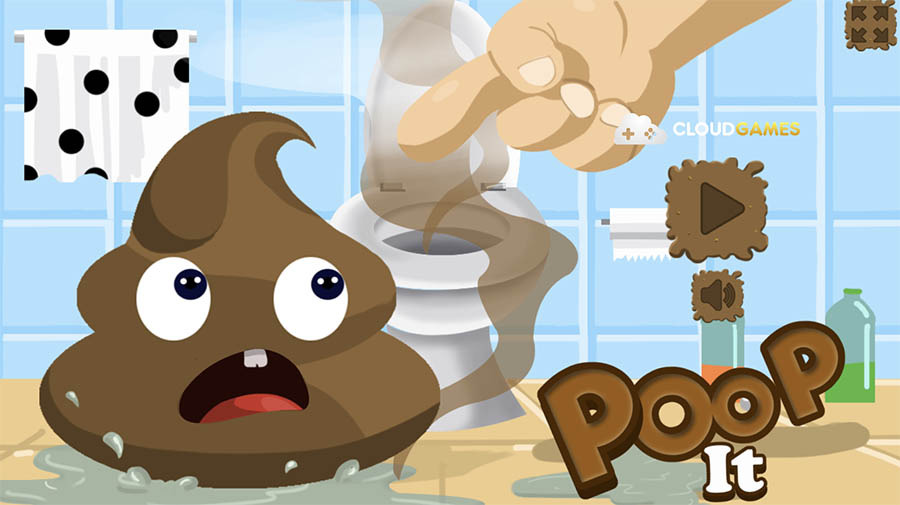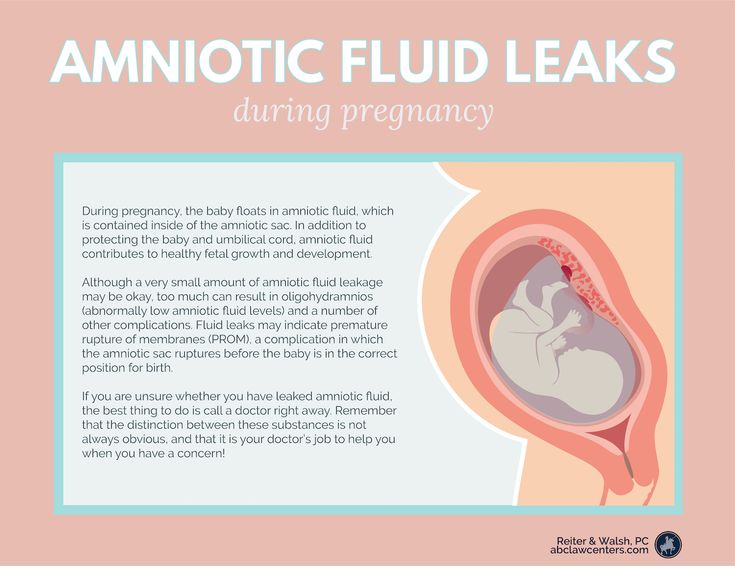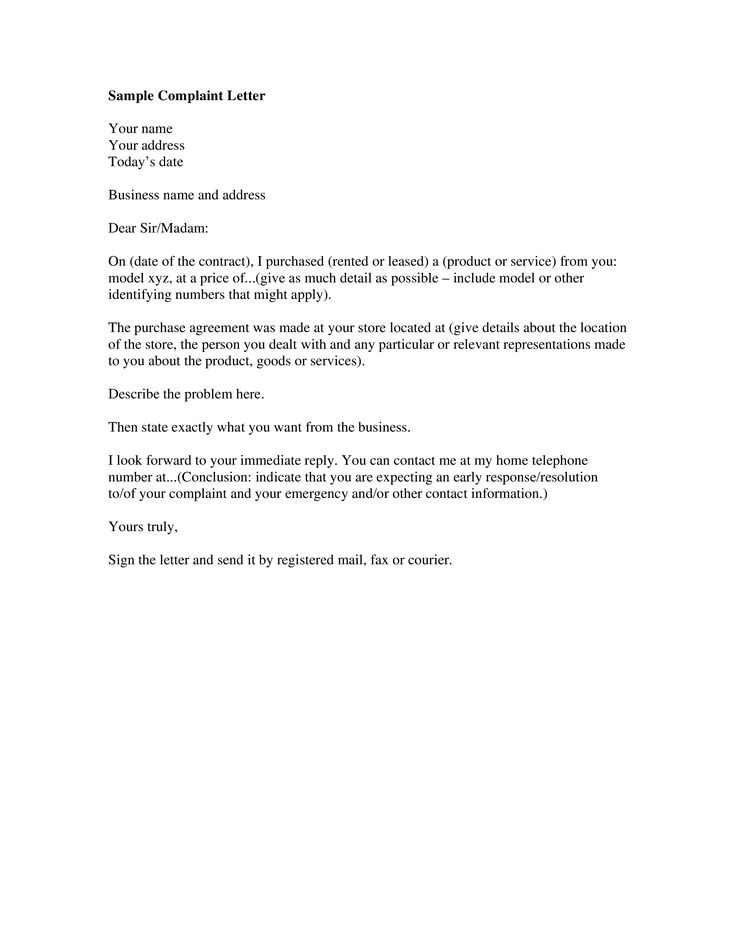Infant cow's milk allergy symptoms
What should I do if I think my baby is allergic or intolerant to cows' milk?
If you think your baby is having a reaction to cows' milk, see your GP to discuss your concerns.
They will be able to assess if your baby's symptoms may be caused by a cows' milk allergy or something else. Make sure you get medical advice before taking cows' milk out of your child's diet as it contains important nutrients.
Cows' milk allergy in babies
Cows' milk allergy (CMA), also called cows' milk protein allergy, is one of the most common childhood food allergies. It is estimated to affect around 7% of babies under 1, though most children grow out of it by the age of 5.
CMA typically develops when cows' milk is first introduced into your baby's diet either in formula or when your baby starts eating solids.
More rarely, it can affect babies who are exclusively breastfed because of cows' milk from the mother's diet passing to the baby through breast milk.
There are 2 main types of CMA:
- immediate CMA – where symptoms typically begin within minutes of having cows' milk
- delayed CMA – where symptoms typically begin several hours, or even days, after having cows' milk
Symptoms of cows' milk allergy
Cows' milk allergy can cause a wide range of symptoms, including:
- skin reactions – such as a red itchy rash or swelling of the lips, face and around the eyes
- digestive problems – such as stomach ache, vomiting, colic, diarrhoea or constipation
- hay fever-like symptoms – such as a runny or blocked nose
- eczema that does not improve with treatment
Occasionally CMA can cause severe allergic symptoms that come on suddenly, such as swelling in the mouth or throat, wheezing, cough, shortness of breath, and difficult, noisy breathing.
A severe allergic reaction, or anaphylaxis, is a medical emergency – call 999 or go immediately to your local hospital A&E department.
Treatment for CMA
If your baby is diagnosed with CMA, you'll be offered advice by your GP or an allergy specialist on how to manage their allergy. You may also be referred to a dietitian.
Treatment involves removing all cows' milk from your child's diet for a period of time.
If your baby is formula-fed, your GP can prescribe special infant formula.
Do not give your child any other type of milk without first getting medical advice.
If your baby is exclusively breastfed, the mother will be advised to avoid all cows' milk products.
Your child should be assessed every 6 to 12 months to see if they have grown out of their allergy.
Read more about cows' milk allergy.
Could it be lactose intolerance?
Lactose intolerance is another type of reaction to milk, when the body cannot digest lactose, a natural sugar found in milk. However, this is not an allergy.
Lactose intolerance can be temporary – for example, it can come on for a few days or weeks after a tummy bug.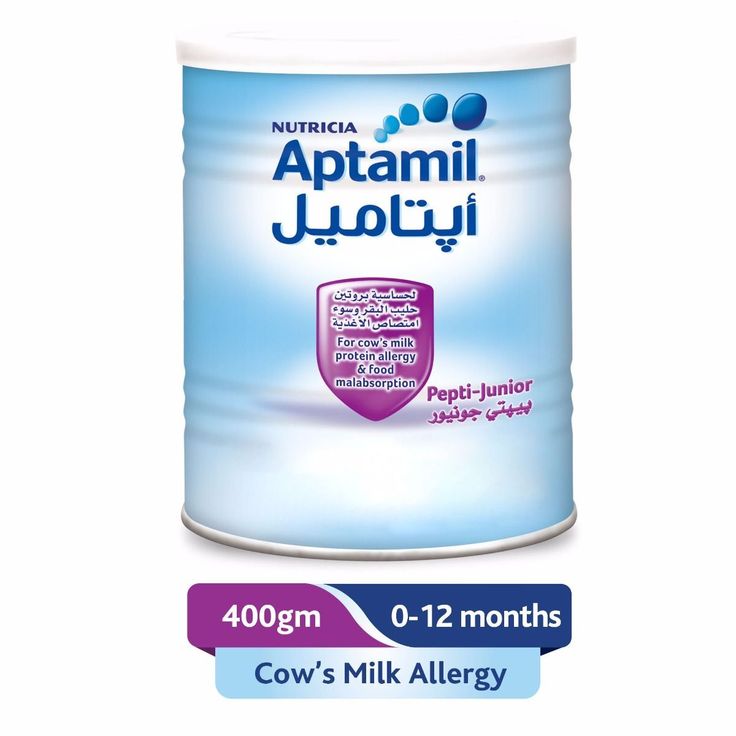
Symptoms of lactose intolerance include:
- diarrhoea
- vomiting
- stomach rumbling and pains
- wind
Treatment for lactose intolerance
Treatment depends on the extent of your child's intolerance. Some children with lactose intolerance may be able to have small amounts of dairy products without having symptoms.
Your child may be referred to a dietitian for specialist advice.
Read more about treatment for lactose intolerance in children.
Further information:
- Colic
- Food allergies in babies and children
- Reflux in babies
- How can I tell if my baby is seriously ill?
- When should I start giving my baby solids?
- National Institute for Health and Care Excellence (NICE): food allergy in children
Page last reviewed: 12 July 2019
Next review due: 12 July 2022
Milk Allergy in Infants (for Parents)
What Is a Milk Allergy?
When a baby is allergic to milk, it means that his or her immune system, which normally fights infections, overreacts to proteins in cow's milk. Every time the child has milk, the body thinks these proteins are harmful invaders and works hard to fight them. This causes an allergic reaction in which the body releases chemicals like
Every time the child has milk, the body thinks these proteins are harmful invaders and works hard to fight them. This causes an allergic reaction in which the body releases chemicals like
histamine.
Cow's milk is in most baby formulas. Babies with a milk allergy often show their first symptoms days to weeks after they first get cow milk-based formula. Breastfed infants have a lower risk of having a milk allergy than formula-fed babies.
People of any age can have a milk allergy, but it's more common in young children. Many kids outgrow it, but some don't.
If your baby has a milk allergy, keep two epinephrine auto-injectors on hand in case of a severe reaction (called anaphylaxis). An epinephrine auto-injector is an easy-to-use prescription medicine that comes in a container about the size of a large pen. Your doctor will show you how to use it.
What Are the Signs & Symptoms of a Milk Allergy?
In children who show symptoms shortly after they have milk, an allergic reaction can cause:
- wheezing
- trouble breathing
- coughing
- hoarseness
- throat tightness
- stomach upset
- vomiting
- diarrhea
- itchy, watery, or swollen eyes
- hives
- swelling
- a drop in blood pressure causing lightheadedness or loss of consciousness
The severity of allergic reactions to milk can vary. The same child can react differently with each exposure. This means that even though one reaction was mild, the next could be more severe and even life-threatening.
The same child can react differently with each exposure. This means that even though one reaction was mild, the next could be more severe and even life-threatening.
Children also can have:
- an intolerance to milk in which symptoms — such as loose stools, blood in the stool, refusal to eat, or irritability or colic — appear hours to days later
- lactose intolerance, which is when the body has trouble digesting milk
If you're not sure if your child has an intolerance versus an allergy, talk to your doctor.
If Your Child Has an Allergic Reaction
If your child has symptoms of an allergic reaction, follow the food allergy action plan your doctor gave you.
If your child has symptoms of a serious reaction (like swelling of the mouth or throat or difficulty breathing, or symptoms involving two different parts of the body, like hives with vomiting):
- Give the epinephrine auto-injector right away. Every second counts in an allergic reaction.
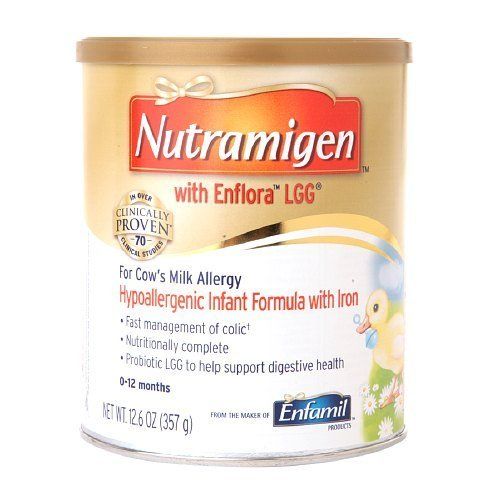
- Then, call 911 or take your child to the emergency room. Your child needs to be under medical supervision because, even if the worst seems to have passed, a second wave of serious symptoms can happen.
How Is a Milk Allergy Diagnosed?
If you think your infant is allergic to milk, call your baby's doctor. He or she will ask you questions and talk to you about what's going on. After the doctor examines your baby, some stool tests and blood tests might be ordered. The doctor may refer you to an allergist (a doctor who specializes in treating allergies).
The allergist might do skin testing. In skin testing, the doctor or nurse will place a tiny bit of milk protein on the skin, then make a small scratch on the skin. If your child reacts to the allergen, the skin will swell a little in that area like an insect bite.
If the allergist finds that your baby is at risk for a serious allergic reaction, epinephrine auto-injectors will be prescribed.
Avoiding a Milk Allergy Reaction
If You're Breastfeeding
If your breastfed infant has a milk allergy, talk to the allergist before changing your diet.
If You're Formula Feeding
If you're formula feeding, your doctor may advise you to switch to an extensively hydrolyzed formula or an amino acid-based formula in which the proteins are broken down into particles so that the formula is less likely to trigger an allergic reaction.
You also might see "partially hydrolyzed" formulas, but these aren't truly hypoallergenic and can lead to a significant allergic reaction.
If you're concerned about a milk allergy, it's always best to talk with your child's doctor and work together to choose a formula that's safe for your baby.
Do not try to make your own formula. Commercial formulas are approved by the U.S. Food and Drug Administration (FDA) and created through a very specialized process that cannot be duplicated at home. Other types of milk that might be safe for an older child with a milk allergy are not safe for infants.
Other types of milk that might be safe for an older child with a milk allergy are not safe for infants.
If you have any questions or concerns, talk with your child's doctor.
Allergy to cow's milk protein in children
Food allergy is a food-induced adverse (pathological) reaction based on immune mechanisms. In children under one year of age, the most common cause of food allergy is cow's milk protein (CMP).
A distinction is made between cow's milk protein allergy and cow's milk protein intolerance. In the first case immune mechanisms are involved, in the second - the baby simply does not have enough enzymes to digest cow's milk protein (for example, lactase deficiency).
There are only 36 cow's milk protein allergens, but 4 of them most often cause food allergies.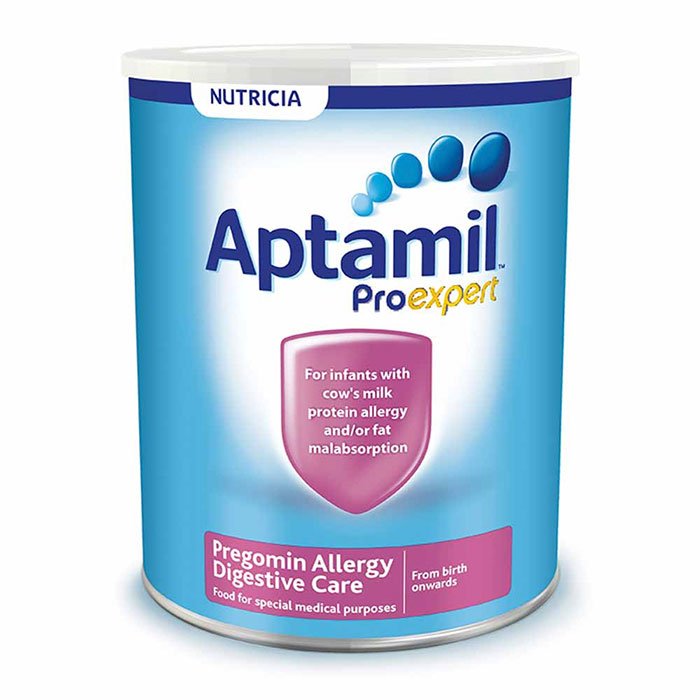
Casein is 80% BCM, it is heat stable (does not break down when boiled) and is not a species-specific protein. This means that if you are allergic to it, you may be allergic to the milk of other animal species.
β - lactoglobulin has the highest allergenic activity, species-specific, not destroyed by boiling. This protein is not found in human milk.
α - lactalbumin is destroyed by boiling, species-specific.
Bovine serum albumin is not destroyed by boiling, if an allergy to this cow's milk protein is detected, the child may also react to beef and veal meat.
It should be noted that mainly children who are formula-fed formulas based on cow's milk protein suffer from allergy to cow's milk protein.
This type of allergy can also develop in children who are breastfed - if the diet of a nursing mother contains products containing cow's milk protein (milk, cheese, cottage cheese, sour cream, butter, fermented milk products), especially in large quantities.
What symptoms suggest that the baby may be allergic to CMP:
- Skin manifestations (dry skin, dry nummular rashes, skin itching).
- Gastrointestinal manifestations (bloating, regurgitation, vomiting, loose stools, possibly mucus and blood-streaked stools).
- Respiratory manifestations (itchy eyes, cough, nasal congestion and even urticaria and Quincke's edema). These symptoms are rare in toddlers, but still possible.
Diagnosis
I must say that if the first manifestations of a food allergy in a baby appeared after switching to artificial feeding with a "regular" adapted formula based on cow's milk, then this is a reason to suspect cow's milk proteins as an allergen.
The next thing is correct history taking : the doctor will definitely find out if anyone in your family suffers from allergic diseases (bronchial asthma, allergic rhinitis, atopic dermatitis, hay fever).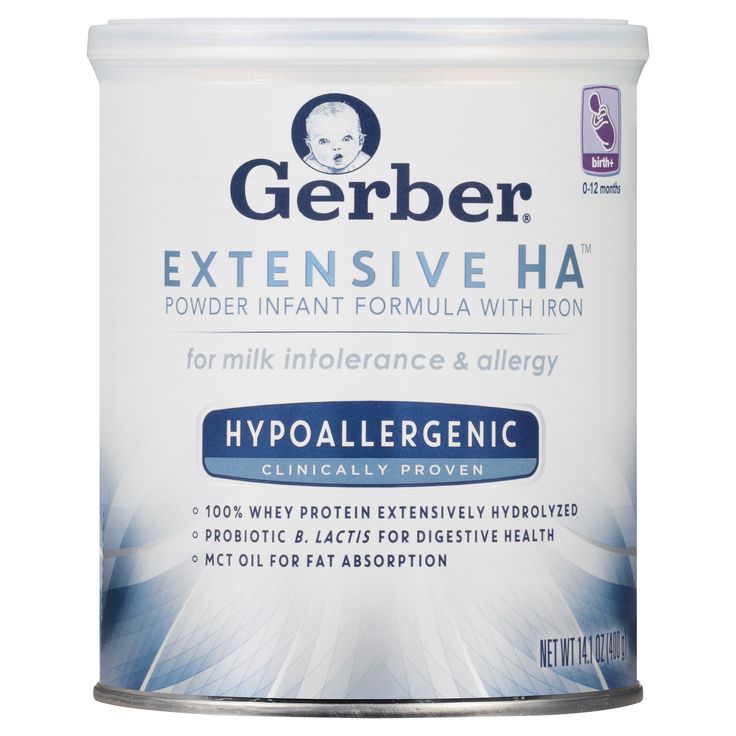 If the family has these diseases, the risk of developing allergies in the baby increases.
If the family has these diseases, the risk of developing allergies in the baby increases.
At the discretion of the doctor, it is possible to take blood from a child for the presence of immunoglobulin E (IgE) antibodies to cow's milk proteins, which were mentioned above. In the presence of IgE antibodies to CMP in the baby's blood, almost 100% confirms that he has an allergy. Paradoxically, the absence of these antibodies does not rule out an allergy to cow's milk proteins, but only indicates that the allergy proceeds through a different type of allergic reaction.
And the simplest, most important and affordable method is the diagnostic diet with the exclusion of products from the child's diet (or from the mother's diet during breastfeeding) containing CMP. The duration of this diet is from 1-2 to 4 weeks. If during these periods there is no improvement in the condition of the baby, then an allergy to CMP is unlikely.
If the child's condition improves, you may need challenge test . This means the introduction of dairy products into the child's diet again. And if the manifestations of allergies return, this will prove an allergy to BCM. This test is carried out under strict medical supervision.
In children who are fed exclusively with breast milk, it is necessary to exclude from the diet of mothers products containing CMP.
There are 3 types of mixtures:
- based on the hydrolysis of whey proteins;
- based on the hydrolysis of the casein fraction;
- based on amino acids.
Allergy is possible for the first two options, the reaction is very unlikely for the third option.
If the baby is bottle-fed, then he must be transferred to amino acid blend or highly hydrolyzed blend. Most infant formulas are made with whole proteins and are therefore not suitable for babies allergic to CMP. They also do not recommend hypoallergenic mixtures, since the protein in them is not sufficiently split and mixtures in goat's milk (cross-reactions).
They also do not recommend hypoallergenic mixtures, since the protein in them is not sufficiently split and mixtures in goat's milk (cross-reactions).
Usually, allergists first transfer children to mixtures based on complete hydrolysis of BCM or casein, if there is no proper effect within 2-3 weeks, it is recommended to transfer the baby to an amino acid mixture.
Perhaps, if the child has severe manifestations of food allergies, the doctor will advise you to immediately transfer the baby to an amino acid mixture. By agreement with the doctor, it is possible to transfer the child to a mixture based on soy protein isolate (from 6 months).
Amino acid mixtures are more easily tolerated by children with various forms of food allergies, as they do not have the bitter taste characteristic of mixtures with a high degree of protein hydrolysis.
Amino acid mixtures can be used both for the short term diagnosis of CMP allergy and as a dietary base for long term use in children with food allergies.
Diet duration — at least 6 months . Then the issue of transferring the baby to a hypoallergenic mixture is decided. In case of recurrence of symptoms, the introduction of dairy products is postponed for another 6 months.
The prognosis for CMP allergy in infants and young children with the correct management of patients is favorable.
Approximately 50% of children by the age of 1 year can be introduced into the diet of foods that include CMP. More than 75% of children by age 3 or older 90% of children by the age of 6 do not show allergic reactions to CMP.
Cow's milk protein allergy (CMP)
- Nestlé Health Science
- health care
- The concept of "Allergy to cow's milk proteins (CMP)"
The concept of "Allergy to cow's milk proteins (CMP)"
What is food allergy?
Food allergies occur when the body's immune system (the body's own defense mechanism) reacts incorrectly to certain foods.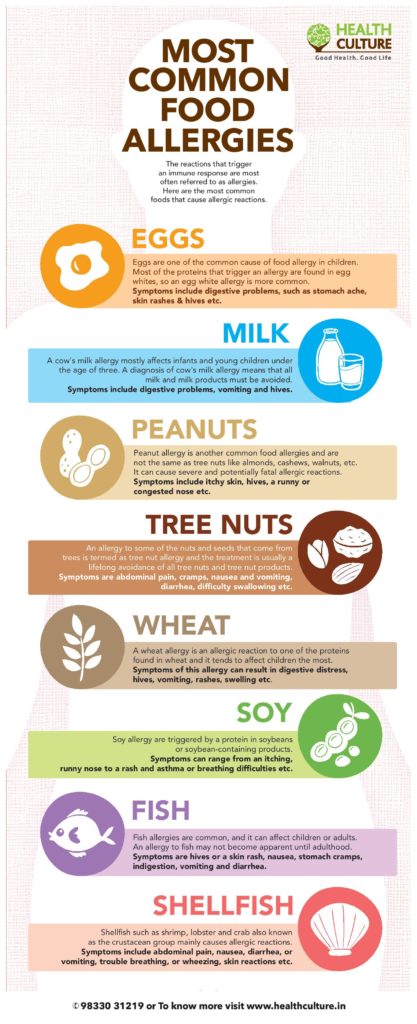 Normally, the immune system helps the body fight harmful things, such as infectious agents. In a food allergy, the immune system misrecognizes certain food components as harmful, leading to unpleasant and sometimes life-threatening allergy-related signs and symptoms.
Normally, the immune system helps the body fight harmful things, such as infectious agents. In a food allergy, the immune system misrecognizes certain food components as harmful, leading to unpleasant and sometimes life-threatening allergy-related signs and symptoms.
Over 120 foods are known to cause food allergies. Cow's milk protein allergy (CMP) is the most common type of food allergy in infants under one year of age.
Do not confuse CMPA with lactose intolerance
Sometimes CMPA is confused with lactose intolerance. Both diseases have some common signs and symptoms, but different causes and treatments.
CMPA usually develops at an early age, while lactose intolerance is extremely rare before the age of 5 years.
What is ABKM?
CMA is a type of food allergy in which the child's immune system reacts to proteins found in cow's milk. As a result, the child develops allergy symptoms: skin problems (rash, hives, dry, flaky or itchy skin), digestive system disorders (diarrhea, vomiting, constipation and reflux) and respiratory problems (noisy breathing, cough, runny nose). CMPA usually occurs before a child's first birthday.
CMPA usually occurs before a child's first birthday.
What is lactose intolerance?
Unlike CMPA, lactose intolerance does not depend on the immune system. This is actually lactase deficiency, the inability to digest the lactose sugar found in cow's milk, and is very rare in children under 5 years of age. Lactose is one of the most important carbohydrates (sugars) in breast milk and is very beneficial for babies. Lactose promotes healthy intestinal flora and calcium absorption.
Cow's milk protein allergy and lactose intolerance are different diseases
learn more about cow's milk protein allergy
All about CMPA
How common is CMPA?
Is CMPA hereditary?
Why does my child have CMPA?
Can CMPA be cured?
What is the difference between the AAA line and hypoallergenic formulas?
Your steps towards the diagnosis of CMPA
Allergy symptoms can be frightening, but CMPA can be easily managed with the right diet, so it's important to get the right diagnosis from your doctor and get treatment on time. If you notice any symptoms in your child that could be associated with CMPA, first of all, don't worry. Discuss the problems with the doctor, the doctor will take the necessary actions to make a final diagnosis. Follow the links below for information and guidance regarding the diagnosis of CMPA and the common signs and symptoms of CMPA.
If you notice any symptoms in your child that could be associated with CMPA, first of all, don't worry. Discuss the problems with the doctor, the doctor will take the necessary actions to make a final diagnosis. Follow the links below for information and guidance regarding the diagnosis of CMPA and the common signs and symptoms of CMPA.
SIGNS AND SYMPTOMS OF CMPA
CMPA is a food allergy, but symptoms can affect more than just the digestive system, they can also affect the respiratory system and skin.
Learn more about the signs and symptoms of CMPA
Symptom Analysis
Diagnosis
To make a diagnosis, the doctor will examine the child and ask about any symptoms you may notice. If an allergy to cow's milk proteins is suspected, a doctor may do certain tests. Once diagnosed, the symptoms of CMPA can be easily managed under the experienced guidance of a physician.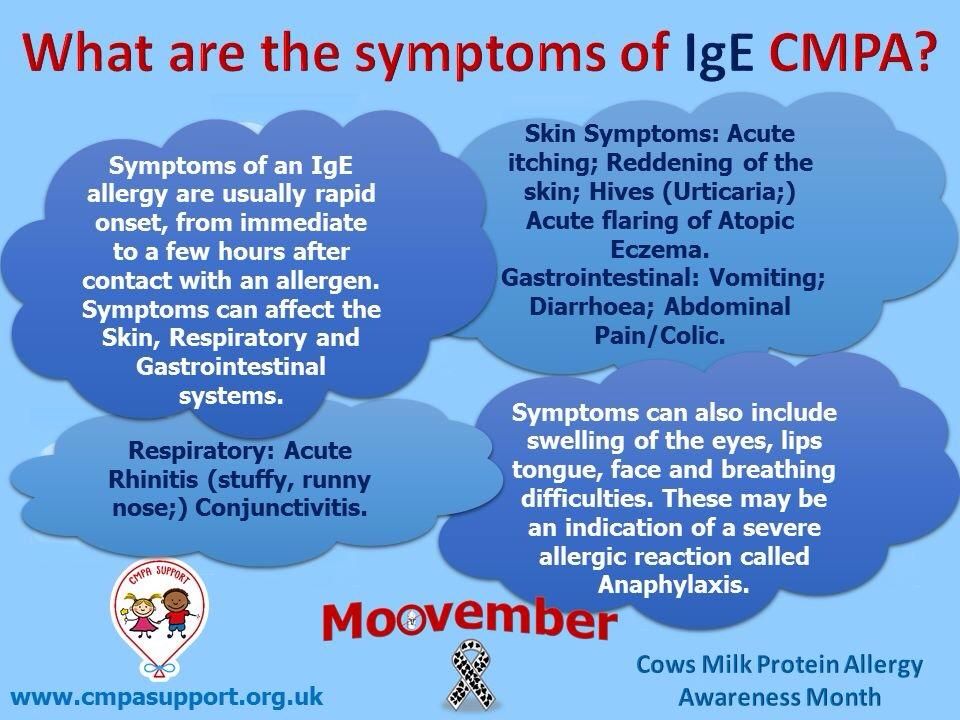
Find out more about the diagnosis of CMHD
Get ready for your doctor's visit
Would you like some help preparing for your doctor's visit? By printing and completing My Child's Symptom Diary, you can be sure that your doctor will have all the information you need to make an accurate diagnosis.
Symptom diary
IMPORTANT NOTE: Breastfeeding may continue if the infant is allergic to cow's milk protein. To do this, the mother needs a special diet with the exclusion of all sources of cow's milk protein. Only if these measures do not bring the desired effect, the doctor recommends the use of a special therapeutic mixture intended for children from 0 to 1 year old. It is important to follow the correct methods of preparing the mixture: using boiled water, sterilized bottles and following the rules for diluting the mixture. Medicinal mixtures intended for diet therapy of CMPA should be used under the supervision of a physician.